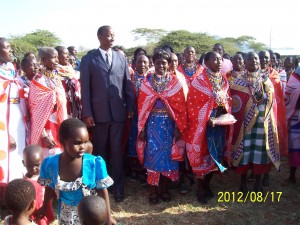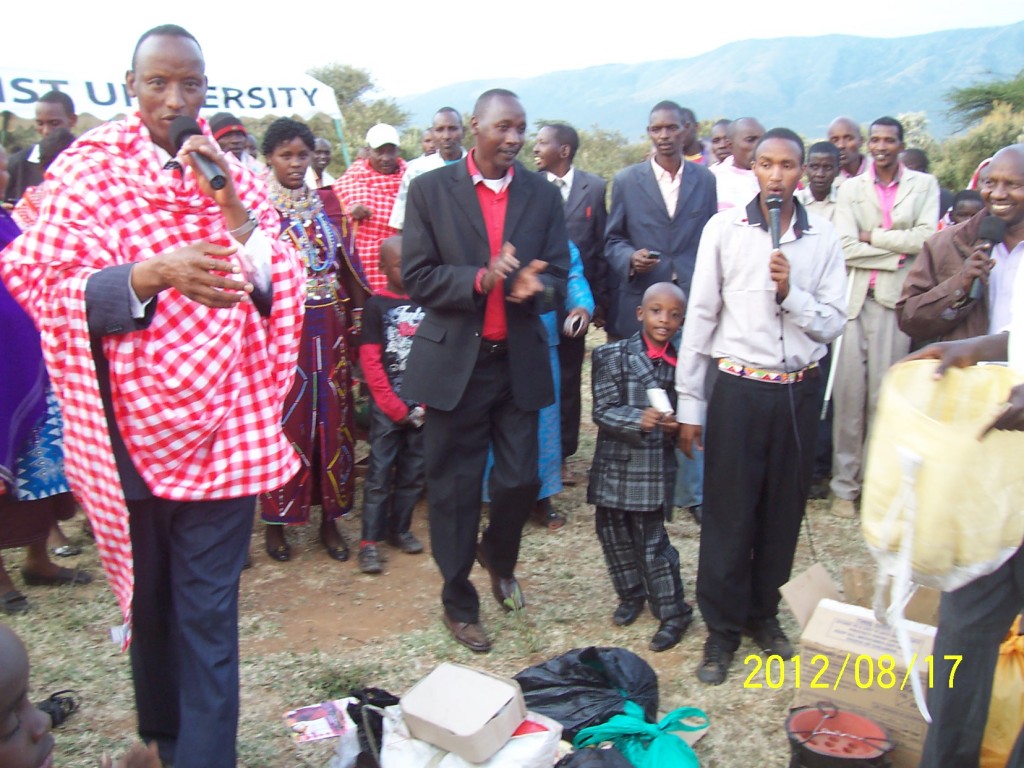
Julius Pulei, a minister and a member of the Maasai tribe who has killed seven lions, is currently far from his home and family in Kenya, living in Visalia where he works with Steven Hickerson, CFO of TraitWare, a software company, to create a nonprofit corporation that will help him with his plan.
Pulei started Christ Servants Ministries in 2004 to support and empower the nomadic Maasai people, a tribe of 500,000 living in the Great Rift Valley of Kenya. The ministry’s current project focuses on five villages of about 5,000 to 10,000 people each that have no water and have to rely on occasional rainwater. The Maasai children have no access to education because there are no schools.
It costs an estimated $50,000 to $60,000 to drill one well in a Maasai community in Kenya. Building a school costs $20,000 and building a church costs $5,000.
“We are working with the people in the United States now to actualize the mission to change the next generation,” Pulei said. “That’s why we have to put down a good foundation, to make sure they survive – to save a generation.”
The Maasai lived a nomadic lifestyle in Kenya, said Pulei, providing a brief history lesson. During the hot season, the tribe lived in the highlands. In the rainy season, they lived in the lowlands.
“When the British came, they pushed them to the dry lowlands,” he said. “The British made a treaty with the Maasai to give their land to the white settlers. They agreed that when the British leave, they will return the land to the Maasai, but when they left (following Kenyan independence in 1963), they returned it to the government.” As a result, the Maasai had to live in the dry parts of the Valley, he added.
Pulei said his life was changed by a Christian missionary who visited his village of Ngong, a small town in the Kajiado District.
“He saw the plight of our village and the suffering from being without water,” he said. “He built a dam, a church and a school. I may never have gone to school if it wasn’t for this missionary.”
Several months ago, Pulei left Kenya to visit Los Angeles because he had a Kenyan friend there who preaches to the homeless. From there, he was brought to Visalia.
“After our cousins Rick and Terri Galvin met him (in Los Angeles) at their small group from Gateway, Rick brought him to our
Tuesday morning men’s Bible study I lead that is held each week at 210,” said Hickerson, who provides Pulei with space in his office. “The book we were studying is by Timothy Keller, the pastor of Redeemer Presbyterian Church in New York City. He is a very famous pastor and writer and the title of this book is Generous Justice, which teaches how to balance the spiritual help with the social help for those in need who are in our community and life so the whole person benefits for now and for eternity.
“We were about one third through the book when Julius joined us and the section we were studying was about helping those who come into our lives who have a need,” continued Hickerson. “So, we put our faith into practice and started helping him. First with his living expenses, then those of his wife and three young children who are in Kenya, followed by helping set up a U.S.-based entity to help him with a long term means of support for his ministry.”
The entity is named Kenya Dirt Road Ministry and Hickerson and Pulei filed for a 501(c)3 to receive tax deductible donations.
Money has already been donated to the ministry.
“One local business, Western Milling, has stepped up to provide funding for the first well for Julius and his neglected people in Kenya,” said Hickerson. “Our local church, Gateway Church of Visalia, has set up a designated fund to receive donations on behalf of Julius while our nonprofit is receiving approval from the IRS.”
The geological survey has already been done for the first well, according to Pulei, adding that he is happy with the two construction bids that have been received. He said that it doesn’t take a lot of time to drill a well.
“Once the equipment is on site, it takes three or four days to be done and have water come up to the surface,” he said. “The next phase is building a tank to store up the water.” It takes two months to install the plumbing a build a generator, he added.
“We’re not just building this for them,” he explained about how the plan should improve things for those in his tribe. “We want them to stand up on their feet. We don’t want to create welfare. We want to create sustainability.”
As poor as Kenya is, refugees from Somalia, Ethiopia, Sudan, Rwanda and Burundi are putting more of a burden on the country’s economy. The refugee camps, which are among the world’s largest, are providing some benefits for the Maasai, however.
“The Maasai go to refugee camps to get food,” Pulei said. “The refugees live better than they do.”
In addition to working on the goals of his ministry while in Visalia, Pulei preaches to the homeless here.
“I just pray with them, going to parks and church on Sunday,” he said, adding that he works with people at the Warehouse Church connected with the Visalia Rescue Mission. “I give them time to talk. You have to give them your time and listen.”

